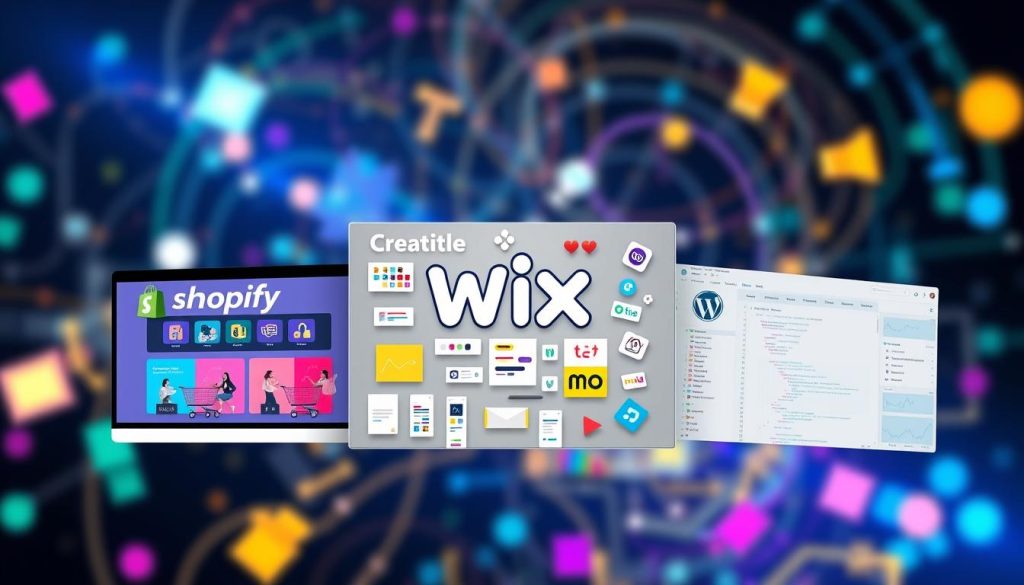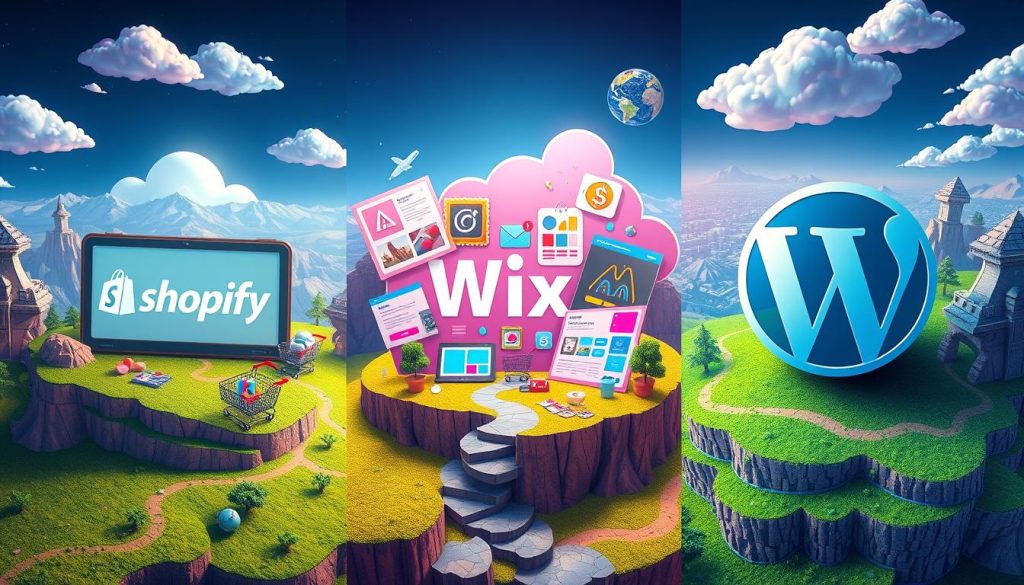Choosing the right website building platform can be tough for small business owners. It affects your online presence, customer experience, and business success. In this guide, we’ll compare Shopify, Wix, and WordPress.
Whether you’re starting your business or updating your website, this guide will help. We’ll cover everything from ease of use to e-commerce features. Our goal is to help you choose the best platform for your needs.

Get ready to find the perfect platform for your digital success. We’ll explore website building and find the solution that boosts your online presence.
Understanding Website Building Platforms: The Basics
Website builders and content management systems (CMS) are key for businesses and individuals online. They offer many features and cater to different needs. This makes them essential in the digital world.
Key Features of Modern Website Builders
Today’s website builders are easy to use and have lots of customizable templates. This lets anyone create online stores, blogs, or portfolios without needing to know a lot about tech. They have drag-and-drop tools and work well with e-commerce, making it easy to build a website.
The Evolution of Content Management Systems
Content management systems have changed a lot over time. They’ve moved from simple HTML sites to dynamic, database-driven systems. Now, platforms like WordPress, Drupal, and Joomla make it easy to manage and update content. They also offer great features for e-commerce, SEO, and marketing.
Different Approaches to Website Creation
- Website Builders: Easy, drag-and-drop interfaces for quick website creation, great for small businesses and individuals.
- Content Management Systems: Flexible, open-source platforms for advanced content management and customization, good for all kinds of websites.
- Custom Development: Custom, code-based development for specific needs, often for big businesses with unique requirements.
Choosing between these depends on your tech skills, website needs, and business goals. Knowing what each offers helps pick the best platform for your online presence.

Shopify vs Wix vs WordPress: Core Platform Differences
Shopify, Wix, and WordPress are all used for building websites and managing content. Each has its own strengths and meets different needs. Knowing what makes each platform unique is key to choosing the right one for your online space.
Shopify is mainly for online stores. It has tools like shopping carts and payment gateways. It’s great for small businesses and entrepreneurs wanting a strong online store.
Wix focuses on making websites easy to create. It has a drag-and-drop interface that’s simple to use. It’s perfect for those who want a visually appealing site without needing to know a lot about tech.
WordPress is used by millions worldwide. It’s good for both blogs and websites. With many plugins and themes, it can be customized to fit any need. It’s popular among bloggers and businesses for its flexibility and features.
| Platform | Primary Purpose | Target Audience | Unique Selling Point |
|---|---|---|---|
| Shopify | Ecommerce | Small-to-medium businesses, entrepreneurs | Comprehensive ecommerce features and tools |
| Wix | Website building | Individuals, small businesses | User-friendly drag-and-drop interface, visual design focus |
| WordPress | Blogging and website development | Bloggers, small businesses, enterprises | Flexible, customizable, and extensive plugin ecosystem |
Choosing between Shopify, Wix, and WordPress depends on your needs. If you’re into ecommerce, blogging, or just want a simple website, one of these platforms might be the best fit for you.

related: Shopify vs Squarespace vs Wix: Best Platform Choice
Ease of Use and Learning Curve Comparison
Website building platforms vary in ease of use and learning curve. This affects how enjoyable it is to use them. Let’s see how Shopify, Wix, and WordPress compare.
Getting Started with Each Platform
Shopify and Wix have drag-and-drop interfaces that are easy for beginners. They let you start building a website quickly. WordPress, while flexible, has a steeper learning curve. It needs a more hands-on approach for managing and customizing your site.
Technical Skills Required
Shopify and Wix need little technical knowledge. They make it easy to manage your website. WordPress, as a CMS, might require knowledge of HTML, CSS, and plugins. This is for more advanced customization and features.
Available Support Resources
All three platforms have lots of support resources. This includes tutorials, documentation, and active user communities. Shopify and Wix have dedicated customer support teams. WordPress relies on its large developer network and online forums for help.
| Feature | Shopify | Wix | WordPress |
|---|---|---|---|
| Ease of Use | High | High | Moderate |
| Learning Curve | Low | Low | Moderate to High |
| Technical Skills Required | Low | Low | Moderate to High |
| Support Resources | Dedicated Support | Dedicated Support | Community-driven |
In summary, Shopify and Wix are great for beginners. They are easy to use and require little technical knowledge. WordPress, while more flexible, needs a bit more technical skill. It’s a good choice for those who want more control over their website.
Pricing Structure and Cost Analysis
Choosing the right platform for your website or online store is crucial. The cost can greatly affect your budget. We’ll compare the pricing of Shopify, Wix, and WordPress, three top website builders and ecommerce platforms.
Shopify Pricing Plans
Shopify has plans for all business sizes. The basic plan is $29 a month, offering key features for an online store. As your business grows, you can move to more advanced plans. The top plan, “Advanced Shopify,” costs $299 a month. You’ll also need to consider domain registration, transaction fees, and app subscriptions.
Wix Pricing Structure
Wix offers a free plan and several paid ones, from $14 to $39 a month. The higher plans give more storage, bandwidth, and ecommerce features. Wix also charges a transaction fee, which depends on your plan.
WordPress Pricing Considerations
WordPress is free and open-source for building websites. But, you’ll need to pay for web hosting, domain registration, and premium themes or plugins. These costs can vary from a few dollars to hundreds, based on your needs.
| Platform | Pricing Plans | Ecommerce Features | Additional Costs |
|---|---|---|---|
| Shopify | $29 – $299/month | Robust ecommerce tools, including online store, inventory management, and payment processing | Domain registration, transaction fees, third-party app subscriptions |
| Wix | $14 – $39/month | Ecommerce capabilities with varying levels of features and storage | Domain registration, transaction fees |
| WordPress | Free (self-hosted) or $4 – $45/month (WordPress.com) | Ecommerce functionality through third-party plugins (e.g., WooCommerce) | Web hosting, domain registration, premium themes/plugins |
When picking a platform, look at your pricing plans, ecommerce needs, and future growth. This ensures you pick the best value for your business.
Design Templates and Customization Options
Building a website starts with design and customization. Shopify, Wix, and WordPress each have their own design features. These features meet the different needs of website owners.
Theme Quality and Variety
Wix has many modern and attractive themes. It’s a top pick for those wanting a sleek look right away. Shopify also has a big library of professional themes for various industries and tastes. WordPress has a huge range of themes, both free and paid, giving users more control and customization.
Design Flexibility
Shopify and Wix make it easy to change your site’s look with drag-and-drop tools. You don’t need to know how to code. WordPress, with its powerful CMS, lets users get creative with custom CSS and HTML. This way, they can make their site look exactly how they want.
Mobile Responsiveness
| Platform | Mobile Responsiveness |
|---|---|
| Shopify | All Shopify themes are mobile-responsive by default, ensuring a seamless user experience across devices. |
| Wix | Wix’s website builder automatically optimizes sites for mobile, with the ability to fine-tune the mobile layout. |
| WordPress | WordPress themes can vary in their mobile responsiveness, requiring users to carefully select a theme or apply custom CSS to ensure a mobile-friendly design. |
Choosing between Shopify, Wix, and WordPress depends on your needs and skills. Shopify and Wix are easy to use. WordPress offers more flexibility for those who want to customize more.
E-commerce Capabilities and Features
Building an online store needs a good website platform. Shopify, Wix, and WordPress each have special features for e-commerce success. Let’s explore what makes them stand out.
Shopify: A Dedicated E-commerce Solution
Shopify is a top choice for ecommerce platforms. It has everything you need to manage your store well. You get great tools for inventory, payments, and more, making it easy to run your online store.
Wix: E-commerce Capabilities Across Plans
Wix is known for building websites, but it also has great e-commerce features. It helps both small and big online stores manage inventory, take payments, and more.
WordPress: Flexible E-commerce through Plugins
WordPress is a content management system without e-commerce built-in. But, with plugins like WooCommerce, it can become a strong ecommerce platform. It handles product management, checkout, and orders well.
| Feature | Shopify | Wix | WordPress + WooCommerce |
|---|---|---|---|
| Inventory Management | ✓ | ✓ | ✓ |
| Payment Gateways | Extensive options | Integrated with Wix Payments | Flexible with various plugins |
| Checkout Experience | Seamless and customizable | Streamlined and mobile-friendly | Customizable with plugins |
| Shipping Options | Advanced shipping rules | Basic shipping configurations | Flexible with shipping plugins |
| Abandoned Cart Recovery | Built-in feature | Basic abandoned cart feature | Requires third-party plugin |
Each platform has its own strengths for building a strong online store. Shopify focuses on e-commerce, Wix is easy to use, and WordPress is flexible with plugins. Your choice depends on your needs, budget, and e-commerce goals.
SEO and Marketing Tools Comparison
Building a strong online presence is key. Using top SEO and marketing tools is essential. Let’s look at what Shopify, Wix, and WordPress offer in this area.
Built-in SEO Features
Each platform has built-in SEO tools to boost search engine rankings. Shopify and Wix make it easy to tweak page titles and meta descriptions. WordPress, with its many plugins, offers more advanced SEO options like Yoast SEO.
Marketing Integration Options
Shopify stands out for its easy integration with e-commerce tools and apps. This makes it great for businesses wanting to simplify their marketing. Wix also has built-in marketing tools like email marketing and social media integration. WordPress, being open-source, has a huge library of marketing plugins for various needs.
Analytics and Reporting
| Platform | Built-in Analytics | Third-party Integration |
|---|---|---|
| Shopify | Comprehensive dashboard with sales, traffic, and customer data | Google Analytics, Facebook Pixel, and other popular tools |
| Wix | Detailed analytics on website traffic, conversions, and user behavior | Google Analytics, Facebook Pixel, and other third-party integrations |
| WordPress | Limited built-in analytics, suitable for basic reporting | Google Analytics, WooCommerce, and a wide range of analytics plugins |
Each platform has its own way of handling analytics and reporting. Shopify and Wix have strong built-in analytics. WordPress uses third-party tools for detailed data and insights.
In conclusion, Shopify, Wix, and WordPress offer a wide range of SEO and marketing tools. These tools help businesses and individuals improve their online presence, attract more visitors, and track their marketing success.
Security Features and Platform Reliability
Choosing the right platform for your website is key. You need to think about security and reliability. This is true whether you’re using web hosting, content management systems, or ecommerce platforms. Your website and data must be safe from cyber threats. The platform should also be dependable and consistent.
Now, let’s compare Shopify, Wix, and WordPress in terms of security and reliability:
- SSL Certificates and Data Protection: All three platforms offer SSL certificates. These protect your website’s data and prevent hacking. Shopify and Wix include SSL certificates by default. WordPress users can install SSL plugins easily.
- Backup and Disaster Recovery: Shopify and Wix take care of backups and disaster recovery. They ensure your website data is safe and can be restored if needed. WordPress users need to set up their own backup solution, which requires more effort.
- Uptime Guarantees: Shopify and Wix promise 99.9% uptime for your website. WordPress, being self-hosted, doesn’t have a specific uptime guarantee. However, most reliable web hosts aim for high uptime rates.
| Feature | Shopify | Wix | WordPress |
|---|---|---|---|
| SSL Certificates | Included | Included | Available via plugins |
| Backup and Disaster Recovery | Automatic backups | Automatic backups | Requires third-party solution |
| Uptime Guarantee | 99.9% | 99.9% | No specific guarantee |
Shopify and Wix offer a more comprehensive experience in terms of security and reliability. They have built-in features and guarantees for businesses and individuals. WordPress, while more flexible and customizable, requires more management for security and reliability. It offers many security plugins and tools to enhance protection.
Performance and Loading Speed Analysis
Building a website means focusing on performance and loading speed. Shopify, Wix, and WordPress are popular choices. Each has its own way of optimizing and delivering content, affecting how users experience your site.
Server Response Times
Server response time shows how fast a website loads. Shopify and Wix are quick, with pages loading in under 2 seconds. WordPress can vary, from under 1 second to several seconds, based on hosting and site complexity.
Optimization Capabilities
Shopify and Wix have built-in tools for better performance. They offer image compression, caching, and CDNs. WordPress needs plugins and setup for similar optimization, which can take more time.
Content Delivery Networks
Content delivery networks (CDNs) make websites load faster by serving content from nearby servers. Shopify and Wix often include CDNs. WordPress users might need a third-party CDN for the same benefits.
In summary, Shopify and Wix usually offer faster performance and loading speeds. They have optimized servers and built-in features. WordPress might need more setup but can still be optimized for fast loading.
Plugin Ecosystem and Third-party Integrations
When it comes to making websites, plugins and integrations are key. Shopify, Wix, and WordPress each have their own ecosystems. These allow users to add more features to their sites.
Shopify has over 6,000 apps for different business needs. Wix has a smaller but carefully chosen selection of apps, with over 300 options.
WordPress is open-source, with over 59,000 plugins. This lets users customize their sites in many ways. Whether it’s for site customization or ecommerce platforms, WordPress has it all.
Choosing a platform means looking at plugin quality and reliability. Shopify and Wix have strict review processes. WordPress users need to pick plugins wisely.
The quality of plugins and integrations greatly affects a site’s customization. It’s a key factor for businesses and individuals choosing a platform.
Scalability and Growth Potential
As your online presence grows, scaling your website becomes key. Shopify, Wix, and WordPress each have their own strengths for growth. They support large businesses well.
Traffic Handling Capabilities
Shopify and WordPress are great at handling lots of website traffic. They use advanced caching to keep your site fast and smooth. Wix also manages traffic well, but might need more tweaking for very busy sites.
Business Expansion Features
These platforms have many features for growing your business. They include tools for managing multiple locations, tracking inventory, and creating reports. Shopify Plus is especially good for big e-commerce sites, offering lots of features for growth.
WordPress and Wix also have scalable options. They help your online business grow and change as needed.
Enterprise-level Solutions
Shopify and WordPress are great for complex needs or lots of customization. Shopify Plus is designed for big merchants, offering advanced tools and support. WordPress can be customized with many plugins to fit large business needs.





